
JOURNAL OF TURBOMACHINERY-TRANSACTIONS OF THE ASME
Scope & Guideline
Connecting Researchers and Practitioners in Turbomachinery
Introduction
Aims and Scopes
- Turbomachinery Performance Optimization:
Research dedicated to improving the aerodynamic and thermodynamic performance of various turbomachinery components, including turbines, compressors, and fans, through innovative design methodologies. - Heat Transfer and Cooling Techniques:
Exploration of advanced cooling methodologies, including film cooling, impingement cooling, and heat transfer mechanisms in turbomachinery, which are crucial for enhancing efficiency and durability. - Fluid Dynamics and Flow Control:
Investigation of fluid dynamics including turbulence modeling, flow separation, and control techniques to optimize performance and mitigate losses in turbomachinery applications. - Experimental and Computational Methods:
Application of both experimental techniques and computational fluid dynamics (CFD) to validate and improve models, ensuring high accuracy in predicting behavior and performance of turbomachinery. - Material and Manufacturing Innovations:
Research into the impact of advanced materials and manufacturing techniques, such as additive manufacturing, on the performance and reliability of turbomachinery components.
Trending and Emerging
- Machine Learning and Data-Driven Approaches:
The integration of machine learning techniques into turbomachinery research is on the rise, with applications in optimizing design, predicting performance, and enhancing turbulence modeling. - Additive Manufacturing Techniques:
Research focusing on the application of additive manufacturing in the production of complex turbomachinery components is gaining momentum, highlighting its potential for improved performance and reduced manufacturing costs. - Advanced Cooling Technologies:
Emerging cooling technologies, such as novel film cooling designs and hybrid cooling strategies, are being increasingly explored to enhance the thermal performance of high-efficiency turbines. - Unsteady Flow Dynamics:
There is a growing emphasis on understanding unsteady flow phenomena, including transient behaviors and their impacts on turbomachinery performance, which are crucial for improving operational reliability. - Multi-Physics and Multi-Scale Modeling:
The trend toward multi-physics and multi-scale modeling approaches is becoming prominent, enabling more comprehensive analyses of turbomachinery systems under various operating conditions.
Declining or Waning
- Basic Theoretical Models:
There has been a noticeable decrease in the publication of papers relying solely on traditional theoretical models without experimental or computational validation, as the field moves toward more data-driven and experimentally validated approaches. - Conventional Cooling Techniques:
Research on conventional cooling techniques has waned, with a shift towards innovative cooling designs and advanced materials, reflecting a trend towards more effective and efficient cooling solutions. - Generic Turbomachinery Applications:
Papers focusing on generic applications of turbomachinery without specific industrial contexts are becoming less frequent, as researchers are increasingly targeting niche applications and specific performance challenges. - Low-Fidelity Simulations:
There is a declining interest in low-fidelity simulation methods in favor of high-fidelity computational models that provide more accurate predictions of turbomachinery performance.
Similar Journals

Archives of Thermodynamics
Advancing the Frontiers of Thermodynamic KnowledgeArchives of Thermodynamics is a reputable journal dedicated to the field of thermodynamics, published by the esteemed POLISH ACADEMY OF SCIENCES. With a robust history since its inception in 2003, this journal serves as a critical platform for disseminating high-quality research aimed at advancing knowledge and technology in thermodynamic systems and processes. Recognized for its contribution to the field, it holds a Q3 ranking in the Physics and Astronomy (miscellaneous) category as of 2023, with a respectable Scopus rank of #148 out of 243, placing it within the 39th percentile. Although it follows a traditional access model, the journal's commitment to scholarly excellence ensures that researchers, professionals, and students alike can benefit from its rich archives and ongoing discussions within the scientific community. Situated in Warsaw, Poland, the journal not only reflects a regional dedication to scientific progress, but also engages with global audiences interested in the evolving landscape of thermodynamic research.
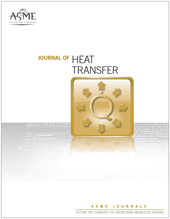
JOURNAL OF HEAT TRANSFER-TRANSACTIONS OF THE ASME
Advancing Knowledge in Heat Transfer Excellence.JOURNAL OF HEAT TRANSFER-TRANSACTIONS OF THE ASME, with ISSN 0022-1481 and E-ISSN 1528-8943, is a leading publication in the field of heat transfer, mechanical engineering, and related disciplines, published by the renowned American Society of Mechanical Engineers (ASME). This esteemed journal, which has been in circulation since 1945, provides a platform for novel research findings and reviews that the mechanical engineering community can rely upon, contributing significantly to the advancement of knowledge in heat transfer processes. The journal is recognized for maintaining a strong impact in several categories, attaining Q2 quartile rankings in Condensed Matter Physics, Mechanical Engineering, and Mechanics of Materials, reflecting its influential role in shaping scientific dialogues. With a commendable Scopus ranking, including a percentile of 63rd in Mechanical Engineering, it attracts submissions from leading researchers and industry professionals alike. Although access options are currently undergoing changes, the commitment to disseminating cutting-edge research remains steadfast. Gathering insights from historical and contemporary studies, the JOURNAL OF HEAT TRANSFER stands as a vital resource for those aiming to innovate in heat transfer technologies and methodologies.
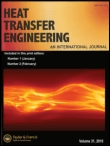
HEAT TRANSFER ENGINEERING
Driving the evolution of thermal management and engineering.HEAT TRANSFER ENGINEERING is a leading international journal published by Taylor & Francis Inc, dedicated to advancing the field of heat transfer and thermal engineering. With a strong focus on the key aspects of Condensed Matter Physics, Fluid Flow and Transfer Processes, and Mechanical Engineering, this journal covers a comprehensive range of topics from experimental studies to theoretical analysis, aiming to foster innovative research and practical applications. Since its inception in 1979 and continuing through 2024, the journal has established itself as an essential resource for researchers and industry professionals alike, reflected in its solid rankings within Scopus—holding a Q2 quartile classification in multiple engineering disciplines. Although not open access, the journal ensures broad accessibility through institutional subscriptions, making cutting-edge research readily available. With its rigorous peer-review process and commitment to quality, HEAT TRANSFER ENGINEERING plays a crucial role in shaping the future of thermal management solutions and engineering practices.
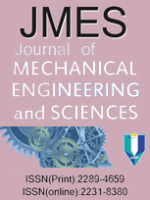
Journal of Mechanical Engineering and Sciences
Fostering Collaboration in Mechanical Engineering DiscoursesThe Journal of Mechanical Engineering and Sciences (ISSN: 2289-4659, E-ISSN: 2231-8380), published by UNIV MALAYSIA PAHANG, is a prominent open access journal established in 2011, dedicated to advancing the field of mechanical engineering and associated sciences. Covering a wide array of topics from industrial manufacturing processes to computational mechanics, the journal serves as a vital platform for researchers, professionals, and students to disseminate innovative findings and methodologies. With impressive Scopus rankings, including a place in the 60th percentile for Industrial and Manufacturing Engineering, the journal holds a significant position among its peers, facilitating global academic discourse. Located in Kuantan, Pahang, Malaysia, the journal emphasizes accessibility and collaboration within the engineering community, encouraging submissions that contribute to both theoretical and applied aspects of mechanical engineering.

INTERNATIONAL JOURNAL OF HEAT AND FLUID FLOW
Unveiling the Science of Heat and Fluid MechanicsFounded in 1979, the INTERNATIONAL JOURNAL OF HEAT AND FLUID FLOW is a premier publication in the fields of mechanical engineering, fluid dynamics, and heat transfer, published by Elsevier Science Inc. With an impressive impact factor and ranking in the Q1 category for Mechanical Engineering and Q2 for Condensed Matter Physics and Fluid Flow and Transfer Processes, this journal is highly regarded for its rigorous peer-reviewed articles that contribute significantly to the advancement of knowledge in these critical areas. Researchers, professionals, and students can access cutting-edge studies that explore the intricacies of thermal and fluid systems, ensuring they stay at the forefront of scientific exploration. The Scopus rankings further affirm its role as a leading source of impactful research, with significant placements in crucial academic categories. Join an active community of scholars committed to innovation and excellence in the exploration of heat and fluid flow phenomena.

Frontiers in Mechanical Engineering-Switzerland
Pioneering Research for a Sustainable FutureFrontiers in Mechanical Engineering-Switzerland, published by FRONTIERS MEDIA SA, is a pioneering open-access journal that has been fostering innovations in the field of mechanical engineering since its inception in 2015. Based in Switzerland, this journal provides a robust platform for disseminating cutting-edge research across multiple disciplines within mechanical engineering, including materials science, industrial and manufacturing engineering, and computer science applications. With impressive Scopus rankings, including Q2 statuses in key categories such as Industrial and Manufacturing Engineering and Mechanical Engineering, it stands out as a valuable resource for researchers and practitioners aiming to stay abreast of trends and breakthroughs in these fields. By embracing open-access principles, the journal ensures that high-quality research is readily available to a global audience, thereby promoting collaboration and knowledge sharing. As it continues to grow, Frontiers in Mechanical Engineering is poised to make significant contributions to both academic and professional communities, enhancing understanding and advancing practices in engineering disciplines.

Journal of the Serbian Society for Computational Mechanics
Advancing Computational FrontiersJournal of the Serbian Society for Computational Mechanics, published by the Serbian Society for Computational Mechanics, is a vital platform for advancing research and knowledge in the field of computational mechanics. Established in 2012, this journal serves the academic community by providing a forum for innovative studies, methodologies, and applications within computational mechanics, presenting valuable insights for researchers, professionals, and students alike. With an ISSN of 1820-6530 and a ranking of Q4 in Computational Mechanics, it carries an essential influence in the engineering realm, despite its current rank of 71 out of 89. The journal's commitment to scholarly excellence aims to foster collaboration and encourage interdisciplinary research, making it an important resource for those invested in the evolving landscape of computational methodologies. Although the journal currently does not offer Open Access options, it remains dedicated to disseminating knowledge that will resonate within the local and global scientific community.

MECCANICA
Advancing Knowledge in Mechanics and PhysicsMECCANICA, an esteemed journal published by Springer, stands at the forefront of research in the fields of Condensed Matter Physics, Mechanical Engineering, and Mechanics of Materials. Established in 1966 and continuing through 2024, this journal provides a robust platform for the dissemination of innovative research and advancements in these increasingly interconnected domains. With an impressive 2023 ranking placing it in the Q2 category across multiple fields, MECCANICA boasts a Scopus rank of #198 in Mechanical Engineering, #150 in Condensed Matter Physics, and #141 in Mechanics of Materials, highlighting its significance and influence within the scholarly community. The journal aims to foster dialogue among researchers, professionals, and students, facilitating the exchange of cutting-edge ideas and methodologies crucial for overcoming contemporary engineering and physics challenges. Readers can access a wealth of knowledge through its comprehensive articles, and while it does not currently offer open access, the journal remains instrumental in shaping the future of engineering and physical sciences.
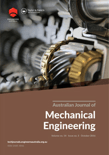
Australian Journal of Mechanical Engineering
Bridging Theory and Practice in Mechanical Engineering Excellence.The Australian Journal of Mechanical Engineering is a distinguished publication in the realm of mechanical engineering, dedicated to advancing the knowledge and application of engineering principles within the industry. Published by TAYLOR & FRANCIS LTD in the United Kingdom, this journal has been integral to the field since its inception, featuring a range of peer-reviewed research articles, reviews, and technical notes that collectively aim to bridge theoretical research with practical applications. With an impressive Scopus ranking of #271 out of 672 in Mechanical Engineering, positioning it within the 59th percentile, the journal continues to uphold rigorous academic standards, currently occupying Q3 in the 2023 quartile rankings. Researchers, professionals, and students alike will benefit from its comprehensive coverage and insightful contributions, providing a vital platform for knowledge exchange and innovation in mechanical engineering.
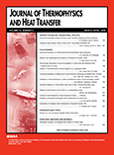
JOURNAL OF THERMOPHYSICS AND HEAT TRANSFER
Exploring Innovative Solutions in ThermophysicsJOURNAL OF THERMOPHYSICS AND HEAT TRANSFER, published by the American Institute of Aeronautics and Astronautics, serves as a vital platform for the dissemination of cutting-edge research in the fields of thermophysics and heat transfer. With an ISSN of 0887-8722 and an E-ISSN of 1533-6808, this journal has been pivotal in enhancing our understanding of heat transfer mechanisms since its inception in 1987, continuing through 2024. It occupies a noteworthy position in various academic categories, boasting Q2 rankings in both Fluid Flow and Transfer Processes and Mechanical Engineering, reflecting its significant contribution to the engineering and physical sciences community. Although it currently does not offer Open Access options, the journal’s repository of rigorous peer-reviewed articles remains accessible to researchers, professionals, and students eager to expand their knowledge and apply innovative findings in aerospace, condensed matter physics, and planetary sciences. Emphasizing both theoretical and experimental approaches, the JOURNAL OF THERMOPHYSICS AND HEAT TRANSFER remains an indispensable resource for advancing the frontiers of engineering and applied sciences.